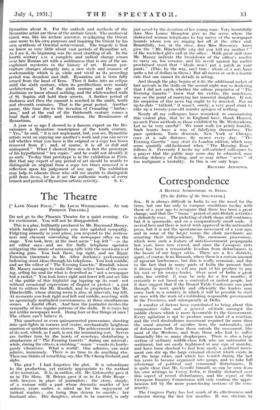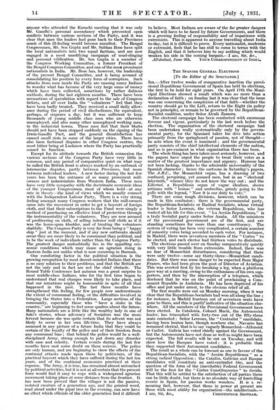Correspondence
A BETTER ATMOSPHERE IN INDIA. [To the Editor of the SPECTATOR.]
Sin,—It is always difficult in India to see the wood for the trees, but one has only to compare conditions to-day with those of a year ago to recognize that there has been a great change, and that the " boom " period of anti-British activities is definitely over. The picketing of cloth shops still continues, but it is spasmodic, and on a comparatively small scale. A revival here and there is noted with approval in the nationalist press, but it is not the spontaneous movement of a year ago, and in some of the larger towns the cloth merchants are asserting their independence. The enormous processions, which were such a feature of anti-Government propaganda last year, have now ceased, and since the Cawnpore riots there has been a remarkable freedom from disturbances in the bazars of our larger cities. There are a few districts, apart, of course, from Burmah, where there is a certain amount of agrarian lawlessness, but this is really economic, and due to the fact that in many parts of India the peasant finds it almost impossible to sell any part of his produce to pay his rent or his money-lender. Over most of India a great calm has settled. It may be only for a few months ; it certainly is not based on a contented or united people, but it does suggest that if the Round Table Conference can push through its work quickly and efficiently the leaders may come back to a country in which it will be possible to start at once with the work of establishing responsible government in the Provinces, and subsequently at Delhi.
A number of factors have contributed to bring about this comparative calm and a general attitude amongst the middle classes which is more favourable to the Government. Every agitation is apt to produce some kind of a reaction, and the civil disobedience movement required far more than the usual amount of sacrifice from the nationalists, and of forbearance both from those outside the movement, like most of the Moslems, and from those who had to suffer financially like so many shopkeepers. There is also a large section of ordinary middle-class folk who are nationalist in sentiment, but are easily frightened at any sign of anarchy, and have been shocked to find how easily a political move- ment can stir up the large criminal element which exists in all the large cities, and which has tended during the last ten years to become organized into gangs, and to take full advantage of political and communal disturbances. It is quite clear that Mr. Gandhi himself, as can be seen from his own writings in Young India, is frankly disturbed over this aspect of recent disturbances, and the report of the Cawnpore Enquiry Commission will only confirm the appre- hension felt by the more peace-loving sections of the com- munity.
The Congress Party has lost much of its effectiveness and cohesion during the last few months. It was obvious to
anyone who attended the Karachi meeting that it was only Mr. Gandhi's personal ascendancy which prevented open conflicts between various sections of the Party, and it was clear that once the leaders had gone back to their Provinces much of this ill-feeling would become manifest. The Bengal Congressmen, Mr. Sen Gupta and Mr. Subhas Bose have split the local nationalists into two equal factions, and are now engaged in a most unedifying campaign of mud-slinging and personal vilification. Mr. Sen Gupta is a member of the Congress Working Committee, a former President of the Bengal Congress Committee, and one of the most prominent nationalists in India. Mr. Bose has, however, the leadership of the present Bengal Committee, and is being accused of consolidating his position by every form of corruption. Such attacks from men inside the Party are causing many Indians to wonder what has become of the very large sums of money which have been collected, sometimes by rather dubious methods, during the last eighteen months. There have been accusations of speculation with regard to the sale of Congress tickets, and all over India the " volunteers " feel that they have been badly treated. They received a small daily allow- ance during the period of civil disobedience, the equivalent, perhaps, of sixpence a day, but it was sufficient to keep thousands of young middle class men who are otherwise unemployed, and also many other unemployed working men, in the industrial towns. These men feel that their bhatta should not have been stopped suddenly on the signing of the Irwin-Gandhi Pact, and the general dissatisfaction has caused small riots in some of the larger cities. There have also been factional disputes in other Congress centres, the most bitter being at Lucknow where the Party has practically ceased to function.
Except for its attitude towards the British connexion the various sections of the Congress Party have very little in common, and any period of comparative quiet on what may be called the British front is always marked by an outbreak of internecine disputes, partly between Provinces, but more between individual leaders. A new factor during the last few years has been the entrance of so many prominent mill- owners and industrialists from Western India. These men have very little sympathy with the doctrinaire economic ideas of the younger Congressmen, most of whom hold—at any rate in theory—the kind of views which we usually connect with the Independent Labour Party. There is a very strong feeling amongst many Congress workers that the mill-owners came into the movement in order to get a boycott of foreign cloth, and that their subscriptions to the Fund were simply a method of purchasing an effective kind of protection through the instrumentality of the volunteers. They are now accused of profiteering on cloth, of selling inferior mill cloth as if it was the home-spun lchaddar, and of treating the volunteers shabbily. The Congress Party is very far from being a" happy ship" just at the moment, and if any new outbreaks should occur they are more likely to be communal than political, and to be the work of individuals rather than the Congress Party. The greatest danger undoubtedly lies in the appalling eco- nomic conditions which may cause an agrarian rising in Eastern India not unlike what is now occurring in Burmah.
One comforting factor in the political situation is the growing recognition by most decent-minded Indians that there is no easy solution to their problems, and that the British are not the only and in fact are not the chief obstacle. The Round Table Conference last autumn was a great surprise to most middle-class Indians, who for the first time began to understand that real changes were likely to take place, and that our intentions might be honourable in spite of all that happened in the past. The last three months have strengthened this feeling, for few people now underestimate the extent of conununal feeling, or the difficulties involved in bringing the States into a Federation. Large sections of the community, especially those who "have a stake in the country," are beginning to feel some qualms about the future. Many nationalists are a little like the wealthy lady in one of Saki's stories, whose advocacy of Socialism was the more fervent because she was quite certain that its advent was not likely to occur in her own life-time. They have always assumed in any picture of a future India that they could be certain of the loyalty of the police and of their freedom from
any communal bias ; that behind the police would be a well-
disciplined Army, strong enough to put down any disorder with ease and celerity. Certain events during the last few months have cast some doubt on these axioms. The police are only human, and are beginning to show the effects of the continual attacks made upon them by politicians, of the practical boycott which they have suffered during the last ten years, and of the continual economies practised at their expense. The Army, it is true, has remained almost untouched by political activities, but it is not at all certain that the present force would find it easy to cope with a widespread agrarian movement taking place at some distance from the frontier. It
has now been proved that the villager is not the passive, isolated creature of a generation ago, and the printed word, read aloud under the pipal tree in the evening, can now have an effect which officials of the older generation find it difficult to believe. Most Indians are aware of the far greater dangers which will have to be faced by future Governments, and there is a growing feeling of responsibility and of impatience with extremists. This is apparent to anyone travelling about India to-day, but it is difficult to prove. Every nationalist, moderate or extremist, feels that he has still to come to terms with the Rnglish, and that it behoves him to say nothing which would weaken his side in the coming bargain.—I am, Sir, &c., Allaliabad, June 9th. Youa ConnaSPONDENT IN INDIA.











































 Previous page
Previous page